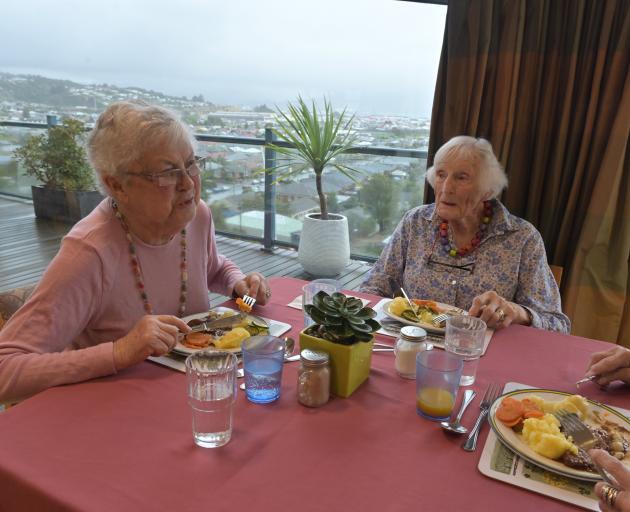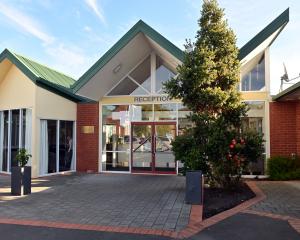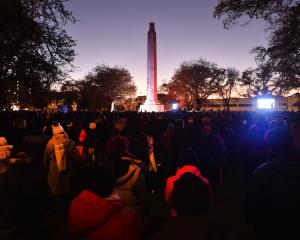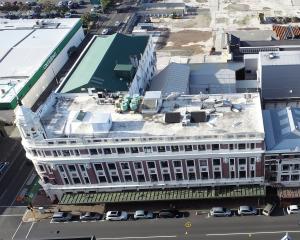Moving home is always a difficult decision, but shifting to a retirement village is the toughest decision many people face.

The move can involve shifting away from community, friends or family, so it needs to be somewhere where the golden years don't turn into base metal.
At its best, it will be a safe, secure environment, where new friends abound.
At is worst, it could cause isolation and loneliness and be a financial challenge - retirement villages do not come cheap.
Prices for units in Dunedin villages range from $300,000 to $500,000.
That is likely to be a cash payment - superannuitants usually cannot get mortgages, and as most villages sell a licence to occupy rather than a fee simple title, the would-be village dweller has no collateral for a bank to hold against a personal loan.
Villages often claim back a portion of the price of the unit to cover maintenance and upgrading costs before the next person moves in, and most also have weekly or monthly charges for upkeep and maintenance.
If you are selling a family house in Maori Hill or Roslyn, village life is likely to be within your price range; if you are selling in Caversham or Brockville, possibly not.
It gets tougher in the regions, and advocacy groups such as Grey Power are concerned people can be forced to stay in homes they can no longer maintain because their property is not valuable enough to cover the cost of moving.
They also fear people are being priced out of resort towns such as Queenstown and Wanaka.
With an ageing population, villages are a booming business though - last month the Dunedin City Council approved plans for a $100million, 380-unit retirement village in Mosgiel.
Taieri is already home to a selection of retirement villages but Shona Innes, secretary manager of Brooklands Village is not concerned about the possible competition - the village's 135 cottages have a waiting list and a steady stream of interested buyers.
"We are about to extend by another nine cottages."
Brooklands started as a rest-home in 1988, when Terry Evans decided to build somewhere his parents could enjoy a happy retirement.
He still pops in weekly, and several family members work at Brooklands.
"It is a family business, not a corporate, and it has a family feel," Ms Innes said.
The 36-bed rest-home level care facility still exists, and the village residents have priority right of access if they need to shift to a care situation.
The village itself does not offer care. It is for people able to live independently - although chef-cooked main meals can be bought if wanted.
While people can keep to themselves if they wish, the heart of Brooklands Village is its Residents' Club.
As well as being a meeting point for village events, it also hosts the village bar and the many clubs and social activities at Brooklands.
Bob Bettison (86) moved to Dunedin from Auckland with wife Dorothy almost two years ago, to be closer to their daughter and her family.

"We are relative newcomers to retirement living, but we have found this place to be just what we wanted," Mr Bettison said.
"You give up a five-bedroom house for a two-bedroom unit and you have a lot of stuff you have to get rid of, but be that as it may.
"We made it our job to become part of the Brooklands community, and everyone has a choice how much of the organised activity they want to be part of, but there are real benefits in participating and meeting all the other people."
A very different type of retirement village option is Frances Hodgkins, in St Clair.
Arguably Dunedin's most visible village, the "Pink Palace" towers above the seaside suburb, offering superb views from its windows.
It is intended to be a top-end establishment, selling premium rooms in a complex which has the look and feel of a resort apartment block, with dining rooms and bars.
Owned by Ryman Healthcare, Frances Hodgkins has 42 two-bedroom apartments, which residents can furnish to their tastes, two floors of serviced one-bedroom or open plan bedsit-style apartments, and 51 rest-home beds.
Ryman also operates the larger Yvette Williams village in Roslyn, which offers hospital-level care and to which Frances Hodgkins residents can transfer if their health requires it.
A range of services is offered at Frances Hodgkins, and residents are prompted to take part in village activities.
"We encourage residents to come to the dining room for meals, and unless they were unwell they would," village manager Joy Notman said.
"Their package includes the main midday meal, and it is very social ... there is also a master plan of activities for all levels of the village that we work to, which involves drives out, bringing in entertainers, making and creating things, music, exercise, it's quite an extensive programme."
Retired pharmacist Don Anderson (72) and wife Ruth (71) moved into Frances Hodgkins five years ago, after ill-health meant Mr Anderson could not maintain their large Kaikorai property.
"It was an acre section with a lot of lawn to mow and gardens to do, and it just became impossible."
The couple moved into their Aramoana crib, took an overseas trip, then decided to move into Frances Hodgkins, where Mrs Anderson's mother was one of the first residents.
"That's probably why it wasn't hard to make the decision, because Mum was very happy and got very good care," Mrs Anderson said.
"We had made up our minds that we needed to be realistic about the future and maybe it happened a little sooner than we expected, but with Don's health we had to think fast.
"It is a very nice place, with nice people, and help is there if you need it."
The couple now divide their time between their two-bedroom apartment, their crib, and trips away in their camper van.

"It's easy, knowing we can just shut the door and come back three months later and you aren't coming back to a whole pile of work, everything is just as you left it."
Not all retirement villages operate on an ownership model.
Some, such as Presbyterian Support's Enliven homes, also offer short-term and long-term rental units.
Others, such as Abbeyfield in Balmacewen, operate almost like a residential hall - except the residents have already graduated from the university of life.
The 10 residents have their own rooms and a shared lounge/dining room and laundry facilities, with meals and home management coming courtesy of the "housekeeper" Robyn Thomson - an employee who keeps Abbeyfield running.
An English concept which has been adopted enthusiastically in New Zealand (there are 16 such homes here) Abbeyfield is an affordable rental option for older people.
There is no capital charge, and rents vary between $341 and $404 per week.
While it is a budget option, it also offers a lifestyle option which appeals to many seniors - some prefer living on a smaller scale to the larger villages.
"Residents are encouraged, but not pressured, to take part in activities around the house," committee member Neil Rodgers said.
"The residents will often organise trips and there is a lot of peer support, with residents who are still driving helping those who are not."
Resident Shirley Erwin (87) has lived in Abbeyfield for a year.
"I had to wait about three months to get in, but it was absolutely worth it," she said.
"You don't get lonely, as there's always someone to talk to, and when you go out you just shut your door like you were in your own home. There's a lovely feel about the place."
The homes
BROOKLANDS VILLAGE
If it is looking to sell itself as somewhere you can live a long and happy life, we are standing in the right part of Brooklands Village.

"In some cases people have been in their cottages for more than 20 years, and in situations like that we upgrade the bathrooms and kitchens, and will add a garage on if there is room to do so."
Brooklands Village offers seven different types of cottage on its Mosgiel campus, starts from $310,000 for a standard one bedroom, up to $525,000 for two bedroom cottage with adjoining garage.
Potential residents need to be 60 or older to apply, but do not need to be retired - some people at Brooklands still commute to work.
On sale of the cottage Brooklands Village retains 27.5% of the purchase price, which is then reinvested in renovating the property.
Residents also pay a $550 per calendar month fee for outside maintenance and garden upkeep, and for some village costs such as maintaining its courtesy coach.
Current residents committee chairman Bob Bettison, 86, is retired chemical engineer.
Coming to Brooklands he and wife Dorothy not only downsized from a large family home to their two bed cottage, but also moved to Dunedin from Auckland for family reasons.
"It is quite different to living in the suburbs, but you have to be prepared to change," Mr Bettison said.
"We were fortunate I suppose that we have lived in five different countries in my working life, so moving and changing was part of us."
Mr Bettison said older people were an asset, not a liability, and the appeal of a community like Brooklands was it gave them a chance to use the abilities and knowledge built up over a lifetime.
"Each day it grows on us more, and there is always the chance to participate and mix with a wide range of people and become part of a real community."
Former residents committee chairman Graham Bills, 81, has been at Brooklands Village for eight years.
His wife died 10 years ago, and suddenly his days had become empty.
"I found I was living in a community where I was the only one in the street during the day time, and it was lonely," he said.
"I had a three bedroom house and a reasonably-sized garden, but I knew that a lot of maintenance was coming up so decided wanted to try retirement village."
After being shown around Mr Bills was sold, and brought his daughter along for a second look before signing up.
"It's been fantastic . . . it's very friendly and we have a lot of fun."
He now has eight neighbours rather than none, and has company whenever he wants.
"It's almost impossible to walk through the village without saying hi to somebody and that's great."
FRANCES HODGKINS

Prices for its 42 independent apartments are around $435,000, plus residents pay a weekly fee of $128.
For that, they live in a bright and airy two bedroom apartment with bathroom, laundry, and an open plan kitchen/living.
People have to be 70 or older to move in and be capable of living independently.
For those who need a small amount of help two floors of serviced apartments are available; starting at $300,000, they are a serviced one bedroom or open plan bedsit-style apartment.
Frances Hodgkins also has a rest-home, which also offers 48 hour crisis care and respite care.
People from serviced apartments can progress down to rest-home as their health changes, village manager Joy Notman said.
"That model works very well, but a lot of people don't conceive that they will need an increase in care, they don't think they will end up in a rest-home or in a serviced apartment, but it does work well and the people are very happy."
Some residents have been in Frances Hodgkins for more than 20 years and staff turnover, in an industry where it is usually high, is low.
Frances Hodgkins normally runs at 98% occupancy so there is a waiting list, but it welcome inquiries as people's situations can change quickly.
People on the list are invited to village activities so they can become familiar with the village and the residents.
"The most rewarding thing is having happy residents, happy staff and happy relatives," Ms Notman said.
Mearn Windsor fits that description.
The 93-year-old moved in 21 years ago, and recently moved from her independent apartment to a serviced apartment.
"You get your own breakfast, but your main meals are provided and they come and change your towels every day and they also wash your sheets."
She moved to Frances Hodgkins from a two storey house with sizeable lawn when she could no longer handle the upkeep.
"You couldn't have better staff, the services are great, I've made nice friends - I couldn't be happier. I think I did the right thing."
Ngaira Devlin, 87, is another Frances Hodgkins veteran, having lived there for eight years.
She had previously rattled around her family home by herself after husband had moved to Montecillo, before deciding apartment life was for her.
"As soon as I walked in the door I know, it was that lovely warm feeling, and every day has been wonderful since."
She regularly has friends and family stay in her two bedroom apartment - it is right next to the bar, she said with a naughty chuckle.
She loved the planned outing, enjoyed cards nights and exercise classes, plus was an avid bowler.
"I don't have very many spare moments . . . my family are thankful I am here and well cared for."
ABBEYFIELD

Local Abbeyfield societies are set up, and volunteers establish and manage the houses.
Every household will have its own housekeeper to look after the house, and to provide the main meals, and to care generally for the residents.
Each resident has their own room, furnished by themselves, for which they pay an affordable rent.
The house also has common areas and facilities shared by the residents, who can mix and mingle as they wish.
"The housekeeper looks after the common areas of house, cooks lunch and dinner every day and keeps an eye on residents - but not to the extent of interfering in people's lives or telling them what to do," committee chairman Alan Somerville said.
Apart from its price - the weekly rent is $415, including food and utilities - its scale is another selling point.
"One way we are different from most of the other villages is that we are not a big place, it doesn't have that institutional feel because we are on a much smaller scale," Mr Somerville said.

"It needs to be affordable, but it also needs to be the style of home someone wants."
However, what Abbeyfield lacks is a care dimension; residents do need to be able to look after themselves.
"It's like flatting for seniors," resident Shirley Erwin, 87, said.
"You don't have the upkeep of your own place, although some have their own wee gardens, so it's an easy living place to be.
"You don't get lonely as there's always someone to talk to, and when you go out you just shut your door like you were in your own home, there's a lovely feel about the place."
Abbeyfield has a waiting list, and prospective tenants have to meet the current residents beforehand.
"This type of living suits some people very well indeed, but it depends what you want," Mr Somerville said.
"Living here is good for people though, because it keeps older people busy and active, in contact with people, eating well, and in a house which is lovely and warm."












